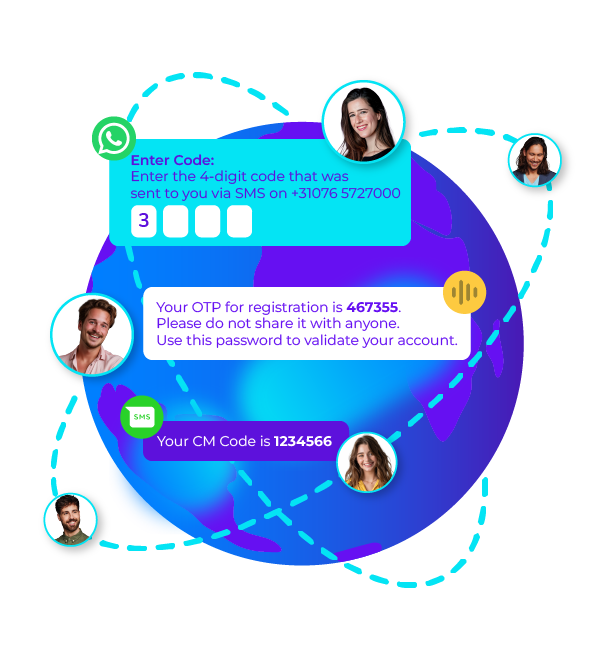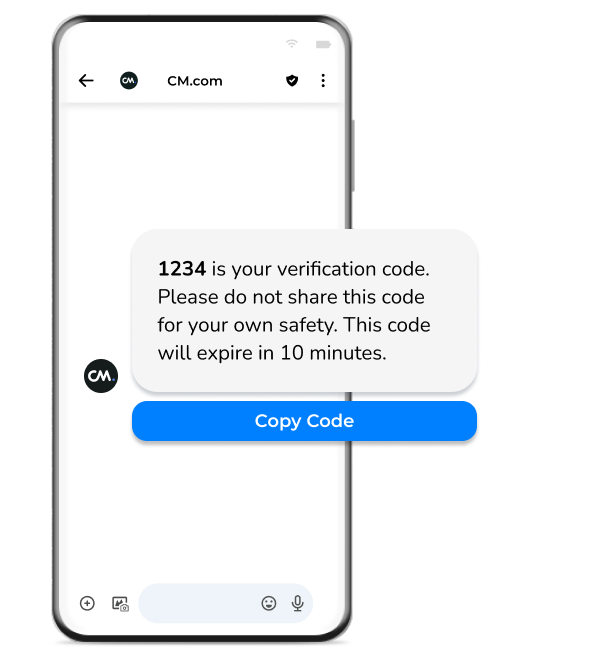


Securing online interactions is a necessity, if you don't want to end up as the next security breach headliner. Implementing a bunch of loose apps and services can actually make you vulnerable for fraud, and it is often cost-inefficient. That's why we now offer our all-in-one OTP API.
We handle the generation and validation of OTP codes, along with the setup and maintenance of the channels. All you need to do is activate your favorite channels and choose your routing preference.
Contact us to get startedRemove risk and friction from the onboarding process by verifying users before creating new accounts
Grant access to users in a smooth and secure way by authenticating logins
Protect data or monetary transactions from fraudsters by adding an additional security layer
Monitor login and changes to online accounts and other data to prevent unauthorized activities
Pick and choose the best channels for your use cases and destinations, all available via one easy API connection. Leverage the top qualities of each channel to your benefit.
Ensure reach and deliverability with SMS or Voice
Increase security with WhatsApp, Viber, or RCS
Reduce costs with email OTPs
Benefit from the worldwide reach of SMS and reach your customers everywhere
WhatsApp's end-to-end encrypted messages make it a secure choice for OTPs
Did customers adopt your native app? Use push notification from within the app
Reach users with limited sight or who live in difficult to reach places
Email requires less personal information from customers, making it accessible
With cybercrime on the rise, it's more important than ever to make sure your online accounts and data are protected. Because nobody wants to see their brand name in the papers as the new security breach headline. Authenticating and monitoring logins, sign-ups, and transactions will put an additional layer of security onto your online services, giving fraudsters less chances to do harm.

One API for the most secure and user friendly verification services including OTPs and Number Verify. Only pay per successful verification.
Build and configure your own tailored verification and security solution with 9 available channels to perfectly fit existing processes.
The CM Safeguard suite contains an extensive set of tools to help protect your account from fraudulent activity. Destination Management, AI anomaly detection, Recipient Limits, Account Limits, Alerts
A One Time Password or OTP is a security code designed to be used for a single login attempt, to minimize the risk of fraudulent login attempts and maintain high security. It’s a string of characters or numbers automatically generated and sent to the user’s phone via SMS, Voice, or Push message.
The OTP has become the standard method worldwide of enabling a login when special circumstances apply, such as validating a new account or confirming a transaction is legitimate.
Providers like CM.com offer OTPs as a service, with a secure platform for receiving or initiating OTP requests, sending the OTP as a text or other channel, and verifying the OTP was entered correctly, so the transaction can go ahead.
The infrastructure for making use of one-time passwords integrates with your website or application using an API. This is how a site “knows” whether an entered OTP is correct or not, with safeguards like checking it’s within the time window.
There are several ways to send an OTP. Some give the option of receiving OTPs by email, although this tends to be less secure. Other providers even enable OTPs as voicemails, stating the PIN aloud when the customer checks the mailbox.
But by far the most common way to send OTPs is by Push or text messaging, typically an SMS or even WhatsApp message to the customer’s mobile phone.
An OTP is generated automatically as a semi-random number or string of characters. There is no way to predict what the OTP will be ahead of time. OTPs are valid for a single login session or transaction, enhancing security by reducing the risk of unauthorized access even if the password is intercepted. Once used, the OTP expires, ensuring it cannot be reused for future logins or transactions.
Select a region to show relevant information. This may change the language.